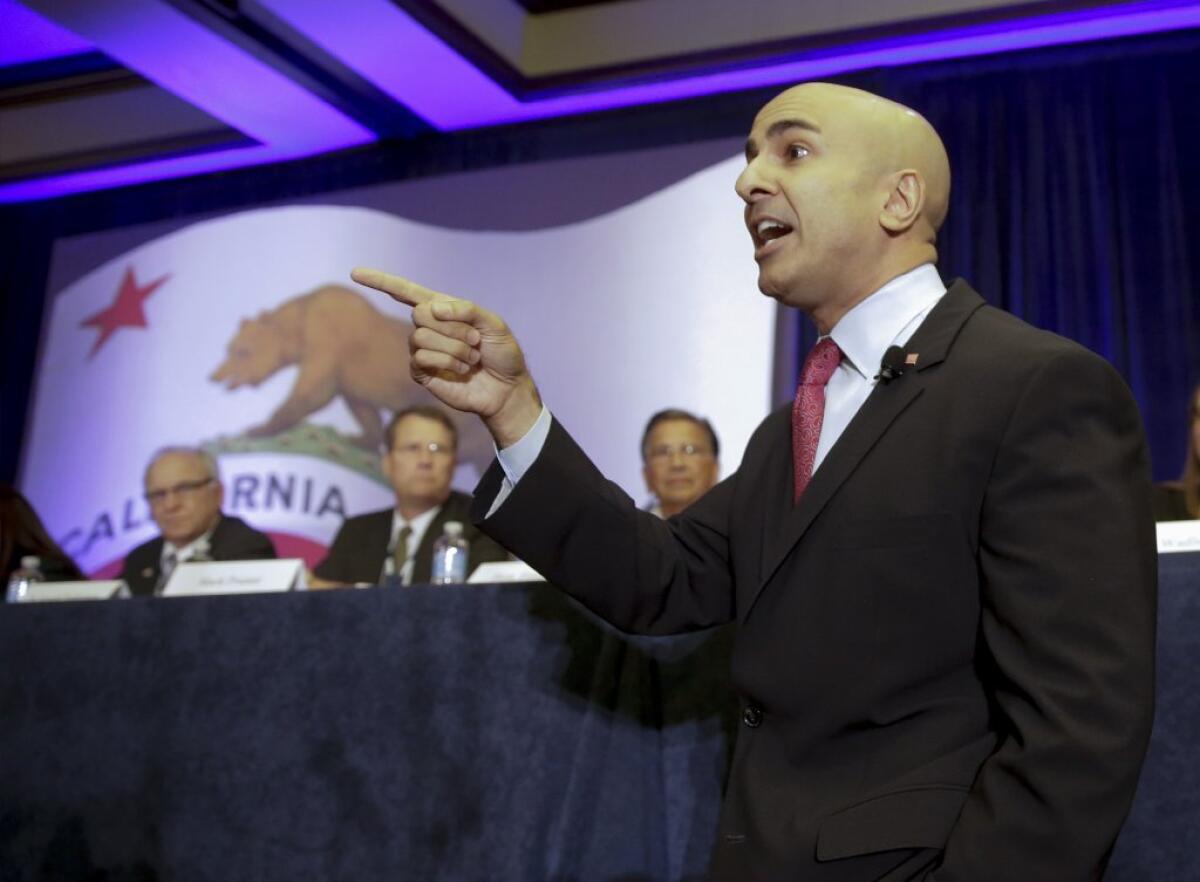Can the California GOP craft a winning campaign strategy?

- Share via
As California’s Republican Party contemplates its way out of the political wilderness, most of the public debate has focused on questions of ideology: Can social conservatives stomach moderation on issues such as abortion or gay marriage in exchange for election victories?
That’s a serious question with lasting implications for the party’s identity, but there’s another discussion underway as well: Is the GOP’s best strategy to pursue change from the top down — securing a statewide office or two to reestablish a beachhead in Sacramento — or from the ground up, doing the painstaking work of electing Republicans to local offices in the hopes that those politicians can amass the experience and credibility to someday recapture offices once held by the likes of Ronald Reagan, Earl Warren and Richard Nixon?
Both approaches are in play during this election cycle. Pressing for change from the top, businessman Neel Kashkari is challenging one of the lions of California politics, Gov. Jerry Brown, the longest-serving governor in the state’s history and the only one to hold the office in two separate stretches (and in two different centuries). Kashkari had to fight his way past a far more conservative opponent, and he argues that this election marks an opportunity for the party to ditch some of the habits that have alienated so many California voters. He’s pro-choice, supports same-sex marriage and has doubts about the war on drugs and the harsh sentences it has imposed, particularly on minority offenders.
Despite those unconventional positions for a Republican, a recent Field poll showed that 71% of conservatives supported Kashkari, at least against Brown. “We’re a case study for this approach,” the candidate told me last week as he hustled between campaign stops.
But if Kashkari’s quest to move his party depends on his winning in November, it’s probably doomed. The same poll that showed him performing well with conservatives had him trailing Brown by more than 20 points among those who consider themselves “middle of the road.” And among liberals, the poll had him losing by a laughable 91% to 1%.
If Kashkari wins, he’ll be in a position to argue that he’s charted a new way. If he loses, however, that’s a harder sell. Meanwhile, Ashley Swearengin, the Fresno mayor who’s running for controller, could be a breakout candidate for the party, as could Pete Peterson in the campaign for secretary of state. But they too are trailing in the polls and facing the formidable head wind of the Democrats’ registration advantage.
Parke Skelton, the consultant for Democrat Betty Yee in the controller’s race, points out that the partisan breakdown of June primary voters in that contest was 43% Democratic to 32% Republican. In the general election, it’s likely to notch up a few points in Democrats’ favor, meaning that roughly 45% of the electorate will be Democratic, compared with just 32% Republican.
Aaron McLear, senior advisor to the Kashkari campaign, pointed out to me last week that, for a Republican to win statewide, he or she needs to carry 95% of Republican voters, two-thirds of independents and about one-third of Democrats. That is, as he said, “tough, really tough.”
So, if a breakthrough is possible but very difficult, what about the more patient work of local campaigns? Ruben Barrales is president of a group called Grow Elect, which is trying to do just that. The organization has been working since 2011 to promote the candidacies of Latino Republicans for city councils, county boards of supervisors and special districts. In that time, the group says it has helped elect 60 candidates.
Barrales agrees that it’s important for Republicans to set a more welcoming tone on social issues — especially immigration — and credits Kashkari with helping to lead the way. But he also recognizes the difficulties confronting any Republican candidate for a statewide office, and he says long-term success can come only through grass-roots organizing and winning races further down the ticket.
That’s particularly true among Latinos, he added. To be consistently competitive, Republicans don’t need to carry a majority of Latinos — something far beyond the party’s reach at this point — but they do need to pull about 30% to 40% of the Latino vote, Barrales said. Without that, the party faces demographic elimination because Latinos are the nation’s fastest-growing ethnic group and command special influence in California.
Winning a statewide office would give Republicans a chance to reset the tone of their relationship with moderates and Latinos, but the road to long-term competitiveness, as Barrales said, runs “right through the barrio.”
Twitter: @newton_jim
More to Read
A cure for the common opinion
Get thought-provoking perspectives with our weekly newsletter.
You may occasionally receive promotional content from the Los Angeles Times.







